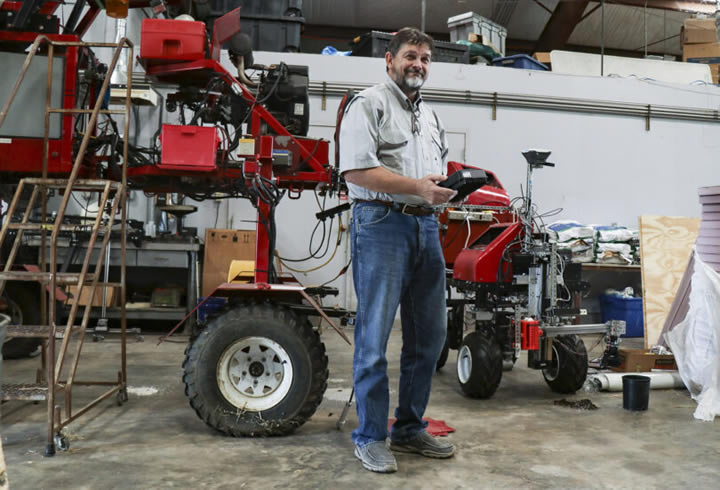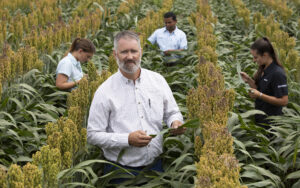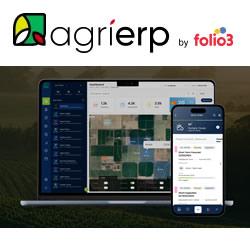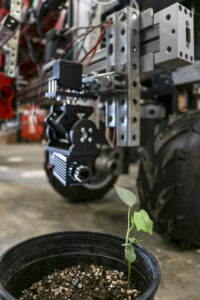UGA awarded $4 million to design farm of the future
Researchers at the University of Georgia College of Agricultural and Environmental Sciences have been awarded nearly $4 million from the U.S. Department of Agriculture’s National Institute of Food and Agriculture (NIFA) to develop a climate-smart “4-D Farm.”

CAES professor Glen Rains holds the control panel to the “Little Red Rover.” The rover is a multipurpose robotic tool that can be used for planting, weed and pest management, and more. The robotic arm’s prototype camera is monitoring a small cotton plant. (Katie Walker)
The project, The Digital and Data-Driven Demonstration Farm (4-D Farm): Juxtaposition of Climate-Smart and Circular Innovations for Future Farm Economies, is part of NIFA’s investment in regional innovations for climate-smart agriculture and forestry.
Led by principal investigator Glen Rains, the project involves an interdisciplinary team across CAES, including researchers in sustainable precision agriculture, data science, livestock management, grass and forage management, crop production, UGA Extension and education programming, and autonomous and intelligent rover research and development. Two sub awards were given to Abraham Baldwin Agricultural College (ABAC) and Clemson University. The project also includes a contracted social economist from Kansas State University.
Leveraging data science for farm resilience
The long-term goal of the 4-D Farm is to develop climate-smart production systems leveraging renewable energy, automation, intelligence and human capital to meet the required food and fiber needs of a burgeoning world population.
Executed across multiple sites in Georgia, the 4-D Farm will feature a 90-acre Demonstrating Applied Technology in Agriculture (DATA) farm on the ABAC campus in Tifton. With roughly half the acreage under a center-pivot irrigation system, researchers will rotate what is in the field to test various management systems.
“We’ll start by adopting things we already know and then adapting them, whether it is precision planting and irrigation or UAVs (unmanned aerial vehicles). It’ll be a challenge, but we hope to be able to show what type of management programs pay off if producers want to integrate precision ag into their farming,” said Rains, a professor in the CAES Department of Entomology.
Multiple Emerging Technology and Data Sites will be located on UGA research farms and a Data Management and Analysis Center will be housed on the UGA Tifton campus at the Future Farmstead Carriage House. The center will allow researchers to share real-time data collection, which could be a game changer for farmers.
“The goal is to be able to collect data and make in-season decisions on irrigation, fertilizer and growth regulators to make a better crop that same year,” Rains said. “Traditionally we haven’t been able to do much until yield is determined at the end of the growing season, then we make changes for the following year. Providing better, real-time information to reduce risk and increase knowledge is doable with advanced data analytics.”
Michael Toews, professor and assistant dean of UGA-Tifton, is proud to have the project based on the south Georgia campus.
“This project leverages a wide breadth of scientific expertise to develop climate-smart technologies and solutions that are cementing UGA-Tifton’s legacy as the destination for applied research, Extension and instruction programs,” Toews said.
Diversifying farming operations for producers and the planet
The 4-D Farm will diversify precision agriculture management systems as well as the crops and livestock in the field. Researchers hope that their methods will provide more information about creating a diversified farming operation that is more profitable for farmers while showing increased efficiency and environmental benefits.

Michael Toews is a professor and assistant dean of UGA-Tifton, home of the 4-D Farm. (Peter Frey/UGA)
“Most currently funded research is driven by individual commodity and discipline needs and rarely investigates integrating multiple agricultural enterprises to improve farm resilience, so that the farmer does not have all their ‘eggs in one basket,’” Rains said. “In this project, data-driven farm strategies will be implemented to create an interdependent and diverse crop and livestock rotation that addresses the reduced effectiveness of chemical inputs, climate change effects, feeding an increasing population, loss of biodiversity and pollinators, water quality and quantity, rural economic sustainability, labor shortages, and supply chain disruptions.”
Researchers will collect data on plant growth, air quality, soil health and more to develop and test resilient agricultural practices and assess the socioeconomic consequences of the new technologies and practices. If successful, the project could benefit both producers and the planet.
Farmers and producers visiting the 4-D Farm will be able to see new technologies and practices in a hands-on environment, helping them determine whether they should invest in new management systems. The farm’s multiple crop rotations will enable producers to see how to manage — and make a profit from — a different type of farming.
But Georgia’s No. 1 industry should not be the only benefactor.
“If these practices show the benefits we think they will — reduced nitrogen, water waste, CO2 emissions, etc. — and farmers adopt them, it creates a much better environment and climate conditions overall,” Rains said. “This project can help us shape the future of farming, and I think we have the team in place to determine how to make it happen.”
To learn more about integrative precision agriculture at UGA, visit iipa.uga.edu.
Comments (0)
This post does not have any comments. Be the first to leave a comment below.
Featured Product


